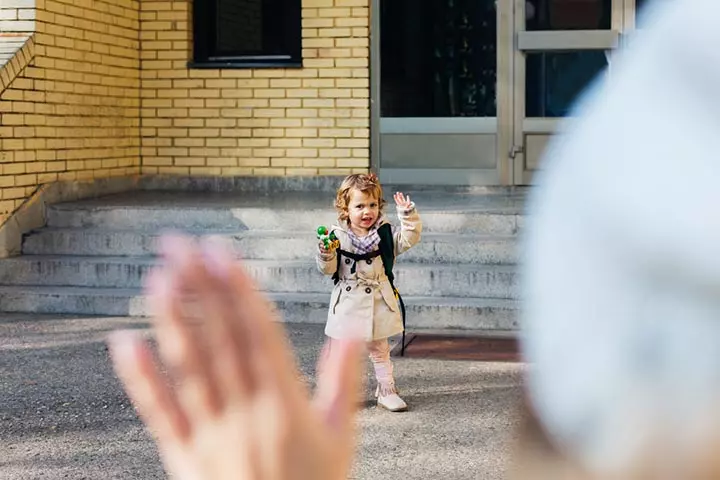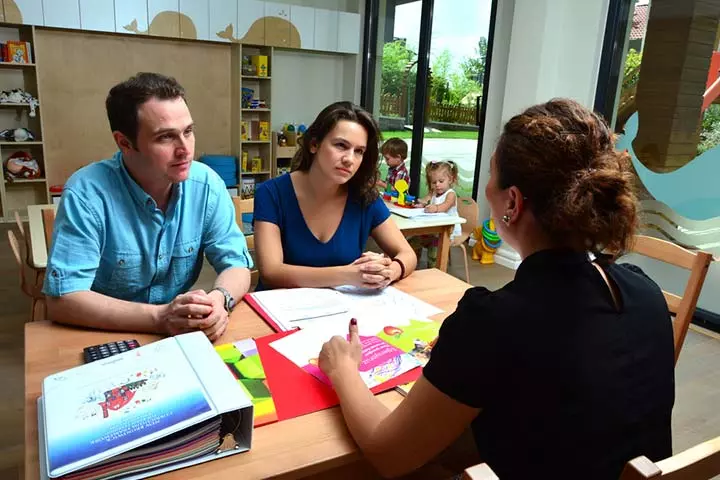

Image: Shutterstock
As our little ones reach the age where they are ready to start going to school, it fills us with much joy and excitement. Most children begin with daycares or preschools where they get accustomed to the classroom environment. But the idea of getting separated from their parents might not sit that well with some kids. Have you faced this problem where dropping off your child at the school is nothing short of a showdown? Forcing the child to go to school every day can be as traumatic to the parents as it is for the child. After all, you don’t want to put your child through any trauma and pain.
In this situation, you have to remind yourself that this is a totally normal thing. This is a transitional phase for your child, and they just require some time to get adjusted to this new regime. Keep your cool and be patient with your child through this phase. We have listed below some ways of dealing with your child’s drop-off anxiety that might be of help:
1. Engage Your Child In An Interesting Conversation
Image: Shutterstock
If your child dreads going to school, the journey from home to school can be really unnerving for them. For little kids, each passing moment in wait can be full of anxiety and worry. It would be great if you could engage your child in a joyful conversation as a way to distract them from this dread. Here, it would be better if you didn’t bring up anything about school and instead talk about something your kid loves, like a particular cartoon or some song. A fun conversation will distract your child from the inevitable. This might also ease the anxiety by the time they finally reach school. And who knows, by the time you reach school, your kid might feel relaxed and ready to start the day!
2. Give Your Child Something To Carry Along From Home
Image: Shutterstock
If the school permits, let your child carry some memorabilia from home. It can be a soft toy or a pendant with your photo. This memorabilia will give your child a sense of being connected to you and home in the new environment. Research has shown that children are attached to their unique set of toys and have emotions attached to them (1). So, the level of comfort that kids would feel having their own toys by their side might not be obtained by giving them some random toy at school. And this is not something that only helps children. Even adults can be comforted by carrying familiar stuff with them when they are off to somewhere far. So, a child carrying something comforting to school is natural.
3. Make Sure Your Child Is Getting Sufficient Sleep And Food
Image: Shutterstock
Children, just like adults, can get moody and cranky when they don’t get sufficient sleep or when they are hungry. When sleep-deprived and low on energy, a child will naturally feel less energetic and would rather stay home than go to school. After all, who would like the idea of spending a full day at school, working through study as well play, when their energy level is at a low. The very idea of going to school in such a situation will seem repulsive to them. So make sure your child gets a full night’s sleep. Trying the “early to bed and early to rise” routine is the best in this case. As for the food, give your child an energy-boosting breakfast. Fibrous food with cereals and fruits can do wonders for your child.
4. The Day Before, Excite Your Child About Going To School
Image: Shutterstock
Children do have a good time at school when they meet friends and engage in fun games. It’s just that they forget these fun moments when they are with you. So the night before, why not remind your child of the things they enjoy in school? Engage your child in a conversation about the excitement and fun activities that lie in wait for them at school. You could also try to memorize the names of your child’s friends. When you engage your child in a conversation about the people they are most fond of, their excitement to go to school would be rejuvenated. Chances are that you wouldn’t even need any coaxing in the morning for sending them to school.
5. Avoid Prolonged Goodbyes
Image: Shutterstock
The more you try to comfort your child by spending extra time, the more they feel the urge to be with you. No matter how bad you feel about it, just drop your child at school and head back. This will shorten the actual moment of separation, and their anxiety will quickly come and go. Trying to comfort your child by spending extra time being at the premises will only keep their focus on you instead of heading to school. So, no matter how much you get the urge to stay and provide a few moments of comfort to your little one, refrain from it.
6. Have A Discussion With The School Staff
Image: Shutterstock
Not enjoying the school environment can be one of the reasons for your child’s anxiety. Have a good discussion with the school staff and ask them how your child is coping with all of it. You can request them to watch your child closely and make sure they are getting along with the other kids. Maybe the staff can help your child make some new friends or address any other issue they might face.
After going through this post, you must be relieved to know that it’s quite a normal phenomenon for children to feel drop-off anxieties. This is especially true in the initial days when children start going to school. Stay patient and maybe apply some of the tips we provided and let time take its due course. Before long, your child might be happily heading to school without needing your constant encouragement. However, if the separation anxiety continues even after a few years of attending school, you can consult a child expert or counselor and get their views on it.
Have you been facing this struggle with your child? Would you like to share your experience with us? Feel free to comment below.
References
- Young Children’s Preference for Unique Owned Objects
https://www.ncbi.nlm.nih.gov/pmc/articles/PMC4983231/
Community Experiences
Join the conversation and become a part of our nurturing community! Share your stories, experiences, and insights to connect with fellow parents.
Read full bio of Tikendrajit Pegu



















